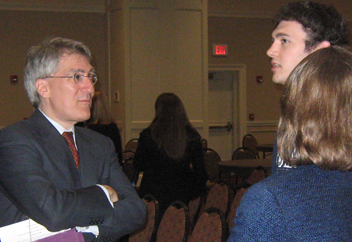
 GREENVILLE—Around 300 people filled Shaw Hall in the Younts Conference Center at Furman University Jan. 26 to hear Princeton University Professor Robert George speak on biotechnology and politics.
GREENVILLE—Around 300 people filled Shaw Hall in the Younts Conference Center at Furman University Jan. 26 to hear Princeton University Professor Robert George speak on biotechnology and politics.
The talk was the first in the school’s Tocqueville Program 2010 lecture series, which explores the place of biotechnology in a free society. A brochure handed out at the start alluded to the challenges ahead.
“Steady advances in the field of biotechnology … have opened a new frontier of ethical and political questions. … Developments in biotechnology have done much to alleviate human suffering.
“At the same time, however, we find ourselves on the threshold of an unprecedented power to shape the character of human life itself … that brings with it a number of fundamental questions that warrant serious and sustained examination.”
George, a Catholic, focused primarily on science, philosophy and religion in the ongoing embryo debate. He said the question of whether an embryo should have the same right to life that a born baby has isn’t a question of religious faith, but one of science.
“Faith can motivate us, but we need not use religious beliefs to confirm that an embryo is a person,” George said.
He said that even in the embryonic stage, the first stage of a person’s life, “we were then as we are now, distinct and complete. A human embryo is a human being at its very earliest stage.”
George is a Harvard Law School graduate who holds Princeton’s celebrated McCormick Chair in Jurisprudence. He is the founding director of the James Madison Program and served on the President’s Council on Bioethics under George W. Bush.
The professor told an audience consisting mostly of students that there is no scientific validity to the term “pre-embryonic” stage of life.
“That’s a term that was invented for political, not scientific, purposes,” he said.
He also disputed the popular notion that even if one concedes that an embryo is a human being, it is so only in a biological sense and therefore has no individual rights, as does a newborn baby.
“That’s not tenable, philosophically,” he said. “Humans possess a rational nature, even as embryos.”
George dismissed the recent advances in cloning and stem cell research as irrelevant to the question of whether a human embryo is a human being and deserving of the same legal rights society currently gives newborns.
He said human embryos are unique in that they are created solely through the uniting of a human sperm and egg.
“You and I never were a stem cell,” he said.
